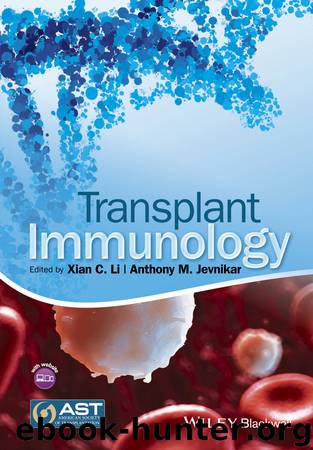Transplant Immunology by Jevnikar Anthony M. Li Xian C. & Anthony M. Jevnikar

Author:Jevnikar, Anthony M.,Li, Xian C. & Anthony M. Jevnikar [Chang, Xian & Jevnikar, Anthony M.]
Language: eng
Format: epub
ISBN: 9781119073017
Publisher: John Wiley & Sons, Inc.
Published: 2015-11-16T00:00:00+00:00
Homeostatic repopulation
Lymphocyte depletional induction agents are now more commonly used in clinical transplantation. Depletional agents include polyclonal anti-T lymphocyte/thymocyte preparations (Thymoglobulin®, ATGAM®) and monoclonal antibodies against lymphocyte markers including CD3 (OKT3) and CD52 (alemtuzumab). Depletional strategies have the advantage of reducing alloreactive T cell precursor frequencies during the time of surgical trauma, reperfusion injury, and inflammatory immune activation. Moreover, the immune system is given the opportunity to “reset” itself, and careful attention to how the immune system reconstitutes is prudent.
Homeostatic proliferation following profound lymphocyte depletional therapies has been recognized as a barrier to tolerance (Wu et al., 2004). In clinical trials, alemtuzumab monotherapy was shown to induce profound and long-lived T and B cell depletion with moderate monocyte and natural killer (NK) cell depletion. However, patients experienced acute rejection despite profoundly low T cell counts, and grafts were laden with monocytic infiltrates on histology. This finding suggests that other cell populations can mediate rejection with minimal T cell support. A study by Cherkassky and colleagues found that patients given antithymocyte globulin induction therapy showed decreased donor-specific responsiveness post-transplantation compared to patients that received IL-2 receptor blockade induction. Rather than a selective depletion of alloreactive T cells, this result may reflect the emerging concept that the repopulating T cell repertoire may be shaped by the continual presence of alloantigen in the setting of immunosuppressive therapies. Thus, while experimental studies have shown that depletion-resistant and homeostatic repopulating cells tend to be memory-like cells, they may not be allo-specific.
Download
This site does not store any files on its server. We only index and link to content provided by other sites. Please contact the content providers to delete copyright contents if any and email us, we'll remove relevant links or contents immediately.
| Anesthesiology | Colon & Rectal |
| General Surgery | Laparoscopic & Robotic |
| Neurosurgery | Ophthalmology |
| Oral & Maxillofacial | Orthopedics |
| Otolaryngology | Plastic |
| Thoracic & Vascular | Transplants |
| Trauma |
Periodization Training for Sports by Tudor Bompa(8241)
Why We Sleep: Unlocking the Power of Sleep and Dreams by Matthew Walker(6688)
Paper Towns by Green John(5168)
The Immortal Life of Henrietta Lacks by Rebecca Skloot(4570)
The Sports Rules Book by Human Kinetics(4374)
Dynamic Alignment Through Imagery by Eric Franklin(4201)
ACSM's Complete Guide to Fitness & Health by ACSM(4044)
Kaplan MCAT Organic Chemistry Review: Created for MCAT 2015 (Kaplan Test Prep) by Kaplan(3994)
Livewired by David Eagleman(3757)
Introduction to Kinesiology by Shirl J. Hoffman(3755)
The Death of the Heart by Elizabeth Bowen(3599)
The River of Consciousness by Oliver Sacks(3590)
Alchemy and Alchemists by C. J. S. Thompson(3506)
Bad Pharma by Ben Goldacre(3415)
Descartes' Error by Antonio Damasio(3264)
The Emperor of All Maladies: A Biography of Cancer by Siddhartha Mukherjee(3135)
The Gene: An Intimate History by Siddhartha Mukherjee(3087)
The Fate of Rome: Climate, Disease, and the End of an Empire (The Princeton History of the Ancient World) by Kyle Harper(3051)
Kaplan MCAT Behavioral Sciences Review: Created for MCAT 2015 (Kaplan Test Prep) by Kaplan(2974)
